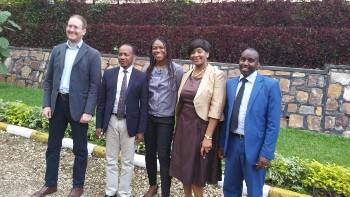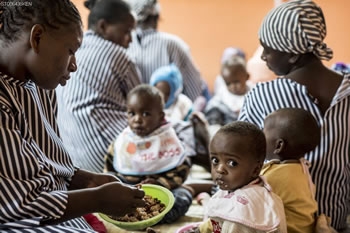Facilitating the Ratification of a Pan-African Medical Regulatory Body

In a ground-breaking proposal to form a health regulatory body spanning the entire continent of Africa, the AMA Treaty was officially adopted in 2018. However, without the proper ratification of this treaty, the African Medicines Agency (AMA) was left unable to act in its position as a continent-wide specialist health agency. In December 2020, A4ID was contacted by International Alliance of Patients’ Organizations (IAPO), to assist in brokering pro bono legal advice to support the ratification of the AMA Treaty.
A4ID evaluated the project and its requirements, bringing in Tom Leary of Blackstone Chambers in London. Tom worked with IAPO to essentially break down the detail within the treaty so that its contents and outcomes could be understood and accepted by all, in particular the domestic legislators whom the agency were relying on to bring this treaty into force.
A Long Time in the Making
The Treaty for the Establishment of the African Medicines Agency (AMA Treaty) was proposed by the African Union (AU) to establish a continent-wide medical and pharmaceutical regulatory body, a concept first put forward more than a decade ago.
Along similar lines to the current European Medicines Agency, the AMA would have the authority to coordinate regulations that govern medicines, traditional medicine, and medical devices across African member states. It would also assist in overcoming challenges such as the lack of local production capacity, and distribution of counterfeit and substandard medicines. The AMA will be the second major specialist health agency established under the auspices of the AU. AMA would complement the African Centres for Diseases Control and Prevention (Africa CDC), recently established to improve the coordination of responses by health institutions to disease threats. The COVID-19 pandemic is just one of the latest health crises demanding a unified, continent-wide approach, and the potential positive impact on improving access to safe and quality medicines for all of Africa is clear to see.
In 2017, consultations were held across the continent with legal and regulatory experts regarding the draft AMA Treaty, the instrument that would lead to the realisation of the AMA. Subsequently, in May 2018, African Health Ministers from the 55 Member States of the AU unanimously adopted the AMA Treaty at the 71st World Health Assembly, the decision-making body of the World Health Organisation (WHO). While encouraging, this was only the first legal procedural hurdle; the AMA Treaty also needed to be ratified by at least 15 AU Member States for it to come into force.
Inaction in the Face of a Health Crisis
In the face of an ongoing pandemic, the distribution of safe and effective vaccines was a matter of the utmost urgency. This could only be achieved through a fast and efficient system of regulatory approval – exactly what the AMA was designed to do. As IAPO explains, in situations where vaccine approval is inconsistent across different countries on the African continent, “[o]ne agency that approves the vaccines for all Member States would be ideal and would accelerate the process.”
Africa lagged behind the rest of the world in terms of distribution from the outset, and the effect of this slow start is still starkly evident. According to the Our World In Data Project , as of November 2021 only 10% of people in Africa had received at least one vaccination dose. In contrast, the region with the highest percentage, the United States of America and Canada, had a first vaccination rate of 71%. Even the second-lowest region, the Middle East, is considerably higher at 46%.
One of the barriers preventing the AMA Treaty from reaching the requisite threshold of ratifications by AU Member States was a deficient understanding among domestic legislators, including Attorney-Generals and policy teams, about what the AMA Treaty would actually entail for their respective countries. IAPO discovered this to their surprise at a webinar that they hosted at the Geneva Health Forum in March 2020.
The Legal Intervention
To overcome this significant obstacle of inertia in reaching the target number of ratifications, A4ID’s assistance was sought by IAPO to obtain pro bono legal advice that would be used to inform government officials on the operation of the AMA Treaty. The legal advice was specifically required to provide clarity on the following:
- What the AMA Treaty was and the obligations it contained.
- The institutional, legislative, policy and practical framework of the AMA Treaty through which vaccines, medicines and health devices will be regulated.
- The extent to which the effectiveness of the signatories’ national medicines regulatory agencies would be bolstered by the AMA Treaty.
- The provisions in the AMA Treaty designed for the benefit of civil society, patient organisations and other non-state actors.
In essence, a lawyer was needed to distil the legal complexities into a primer on the AMA Treaty that could be understood by all. At the time of IAPO’s request in December 2020, nearly two and a half years after the adoption of the AMA Treaty, only a mere six countries had ratified the treaty. A4ID was able to find the right lawyer very quickly.
Tom Leary, a barrister at the London Bar, provided this legal advice pro bono for IAPO to use in its advocacy work to persuade more AU Member States to ratify the AMA Treaty. The advice was used to engage with legislators, particularly Attorneys General, and advocate for the ratification of the AMA Treaty at a webinar hosted by IAPO in London, in partnership with the International Federation of Pharmaceutical Manufacturers and Associations. Significantly, two days after IAPO’s presentation, the AU’s Executive Council made a formal request for the AU Commission to appoint a Special Envoy for the AMA and oversee and encourage the signing, ratification and deposition of treaty instruments by Member States.
A written legal opinion prepared by counsel in support of IAPO’s compelling advocacy was highly valued by the participants and provided the gravitas required to spur AU Member States into action. Some of the participants were aware of A4ID and its longstanding reputation in the development sector which provided them with greater assurance. IAPO found Tom to be “tremendously professional” and sensitive to IAPO’s patient-centric outlook. Kawaldip Sehmi, Chief Executive Officer at IAPO praised Tom for producing a “high-quality piece of work”, which enhanced the credibility of IAPO’s advocacy among government officials as well as ultimately providing the basis for an educational tool on the AMA Treaty for policy teams, providing AU Member States with the clarity and confidence to move forward with the necessary ratifications.
Enhanced Civil Society Engagement
An unexpected impact of IAPO’s project has been the opening up of a space for civil society engagement, in this case patient groups, in the regional health sector governance.
In this instance, benefits were also accrued to civil society more widely, beyond patient groups. On the advice from counsel, IAPO was provided with the assurance and confidence to take the initiative to convene a multi-stakeholder collective of organisations known as the African Medicines Agency Treaty Alliance (AMATA), to strengthen the African pharmaceutical regulatory system for timely access to innovative, safe, quality, and effective medicines and medical devices that are accessible for better pandemic preparedness. Membership of AMATA extended to health professional associations, academic and research bodies, non-state actors in official relationship with the WHO and their African Members or chapters, and public-private partnerships. This included medicines and health devices, and African and international trade associations. In February 2021, IAPO spearheaded the Alliance to issue a call to AU Member States to ratify the AMA Treaty.
The AMA Treaty comes into Force
On 5 November 2021, the AMA Treaty came into force when Cameroon became the required fifteenth AU Member State to ratify the treaty. Former Malian Health Minister, UN Under-Secretary General and Executive Director of UNAIDS, Michael Sidibé, the AU’s appointed Special Envoy on the AMA, described the event as a “historic moment”. Likewise, Amira Elfadil, the Commissioner for Social Affairs at the AU, issued a press release declaring that this marked a “great milestone that opens a new chapter for harmonization and regulation of the African pharmaceutical landscape.”
Whilst the AMA Treaty has now officially come into effect, the IAPO-led AMATA has not taken its eye off the ball, aware that there are still challenges up ahead to set up the AMA Treaty, calling on the AU “to prepare for the practical implementation of the Agency.”
Ultimately however, the establishment of the AMA, and the achievement of the AMA Treaty successfully coming into force as a legally binding instrument, is a moment to celebrate, bringing us a step closer to a world where the importance and value of all human life is judged as equal.
SDG 3: Good Health and Well-Being
The ratification of the AMA Treaty contributes substantially to SDG 3 (good health and well-being), specifically Target 3.8: “Achieve universal health coverage, including financial risk protection, access to quality essential health-care services and access to safe, effective, quality and affordable essential medicines and vaccines for all.” Moreover, the AMA Treaty will help to reduce inequalities among countries (SDG 10) and moves towards the goal of strengthening the implementation of the SDGs through partnerships (SDG 17).
This case study is an excellent example of how the legal community can support in achieving specific targets of the SDGs. Good health is central to human happiness and well-being, as well as being instrumental to poverty reduction. Laws are essential to design or improve a health coverage scheme that is truly universal. In order to create effective change, lawyers must strengthen their understanding of the legal factors that impact health, and in particular, universal health coverage. Armed with this knowledge, lawyers can play a key role in promoting legal and policy reform to support the achievement of SDG 3.
Law firms, corporate legal departments, judiciaries and barrister’s chambers can partner with A4ID to provide pro bono legal services to governmental and non-governmental organisations dedicated to improving human health and well-being.

